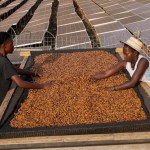(JUBA) – Global coffee drinkers, including South Sudan’s growing urban café community, may soon notice their daily cup tasting very different as climate change reshapes how and where coffee is grown.
A surge in extreme weather has pushed traditional coffee varieties such as arabica and robusta into decline, forcing farmers across the world to experiment with alternative species that produce unusual flavours and in some cases bizarre looking beans. The shift is already being seen in Nzara, Western Equatoria, where workers are drying excelsa beans – a hardy species now gaining international attention.
Over the past year, the world has consumed more coffee than was produced, sending prices to record levels. Arabica futures reached about $4.20 per pound in mid September. This is up more than 50 per cent since August due to heat and low rainfall in Brazil, which supplies around 40 per cent of global arabica output. Prices briefly exceeded $4.40 per pound in February before sliding back to $3.70 last week.
Robusta, favoured for instant coffee and widely used in blends, was also hit after dry conditions wiped out harvests in Vietnam, which accounts for 40 per cent of world exports. Although café prices in countries like Australia and South Sudan have not yet fully reflected these costs, many in the industry expect that to change soon, especially as demand from China increases.
Australia’s average café coffee price reached $5.50 (39,050 SSP) this year, up from $4 before the pandemic. In parts of Europe, a basic cup now costs as much as $10 (71,000 SSP).
To cope, scientists and growers are turning to lesser-known species. Excelsa and liberica, which are more tolerant of heat and drought, are being planted in countries such as Uganda, Vietnam and South Sudan. These beans produce sharp, fruity, smoky or woody flavours that can dominate the entire cup, a dramatic change from the chocolate and caramel taste that customers are used to.
Excelsa is suited to mid-altitude regions and can grow up to 15 metres high, making it difficult to harvest. Liberica grows even at sea level and produces very large, pointed beans with low acidity. Both were once rejected by farmers for being too hard to manage, but rising temperatures have made them valuable again.
Coffee Price Movements
| Coffee Type | September 2024 Price (per lb) | February 2025 Peak | September 2025 Price |
|---|---|---|---|
| Arabica | $2.30 | $4.40 | $3.70 – $4.20 |
| Robusta | Record highs reported | — | Remains elevated |
South Sudan, which has fertile conditions in Western Equatoria and parts of Central and Eastern Equatoria, is now positioned to benefit from this shift. Excelsa farming is already taking place in Nzara, and agricultural investors are watching whether the country could become a supplier to regional markets such as Kenya, Uganda and Ethiopia.
Local café owners in East Africa are slowly testing the new species. In Melbourne, Australia, some shops now offer liberica on a limited basis. Coffee importers there admit the bean is not yet commercially viable due to high prices, but they expect demand to grow once supply increases.
Industry experts warn that climate pressure will eventually force change whether consumers like it or not. A scientist at the University of Queensland summed it up bluntly: “Climate change is not good news for coffee. Premium varieties will become rare.”
For South Sudan, this may be an opportunity rather than a crisis. While countries like Brazil and Vietnam struggle with unpredictable weather, South Sudanese farmers in cooler, elevated regions could diversify into climate resilient cash crops that are suddenly gaining global interest.
Coffee Market Climate Impact – Summary Table
| Category | Key Details | Relevance to South Sudan |
|---|---|---|
| Global Coffee Deficit | World consumed more coffee than was produced in past 12 months | Opens export opportunity for emerging producers |
| Arabica Price Range (2024–2025) | $2.30 → $4.40 peak → $3.70–$4.20 per lb | Over SSP 15,000 per pound minimum price |
| Australian Average Cup Price (2025) | $5.50 per cup | Equivalent to 39,050 SSP |
| European Café Price Range | Up to $10 per cup | Equivalent to 71,000 SSP |
| Main Climate Issues | Heat and drought in Brazil and Vietnam | South Sudan shares similar risks but has highland resilience |
| Traditional Species Under Pressure | Arabica (premium), Robusta (mass market) | Farmers advised to diversify |
| Emerging Species | Excelsa, Liberica, Timor Hybrid | Excelsa already grown in Nzara, South Sudan |
| Excelsa Advantages | Heat and drought resistant, fruity and nutty flavours | Suited to Equatoria highlands |
| Liberica Advantages | Grows at low altitude, bold smoky flavour | Potential for Bahr el Ghazal and Jonglei lowlands |
| Harvest Maturity Time | 3 years for new species | Requires patient investment planning |
| Current Market Adoption | Still niche in London, Melbourne, USA | Early movers in South Sudan could sell specialty beans |
| Industry Outlook | Climate will decide future supply and taste | South Sudan can position itself as a climate-resilient grower |


















































